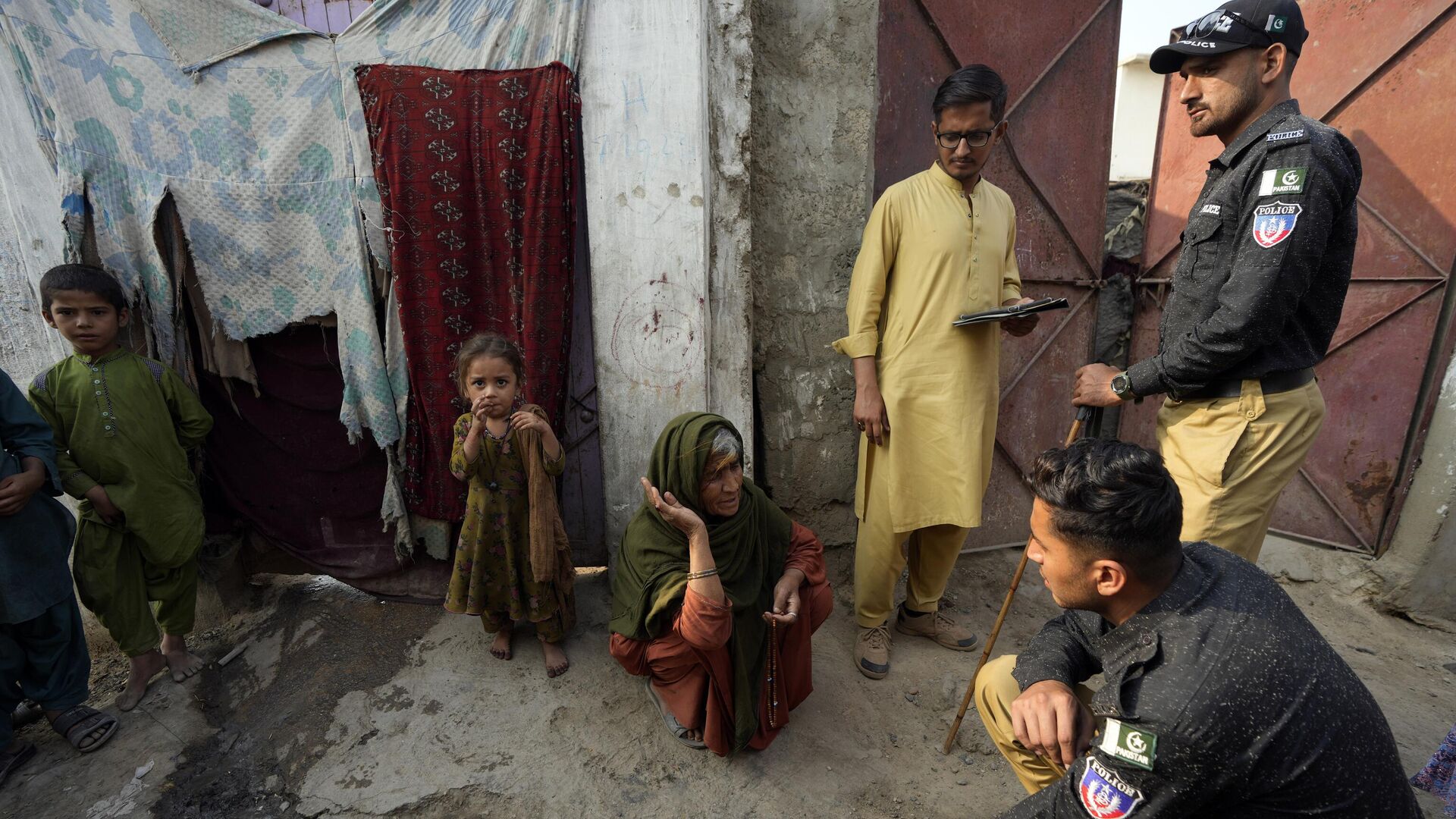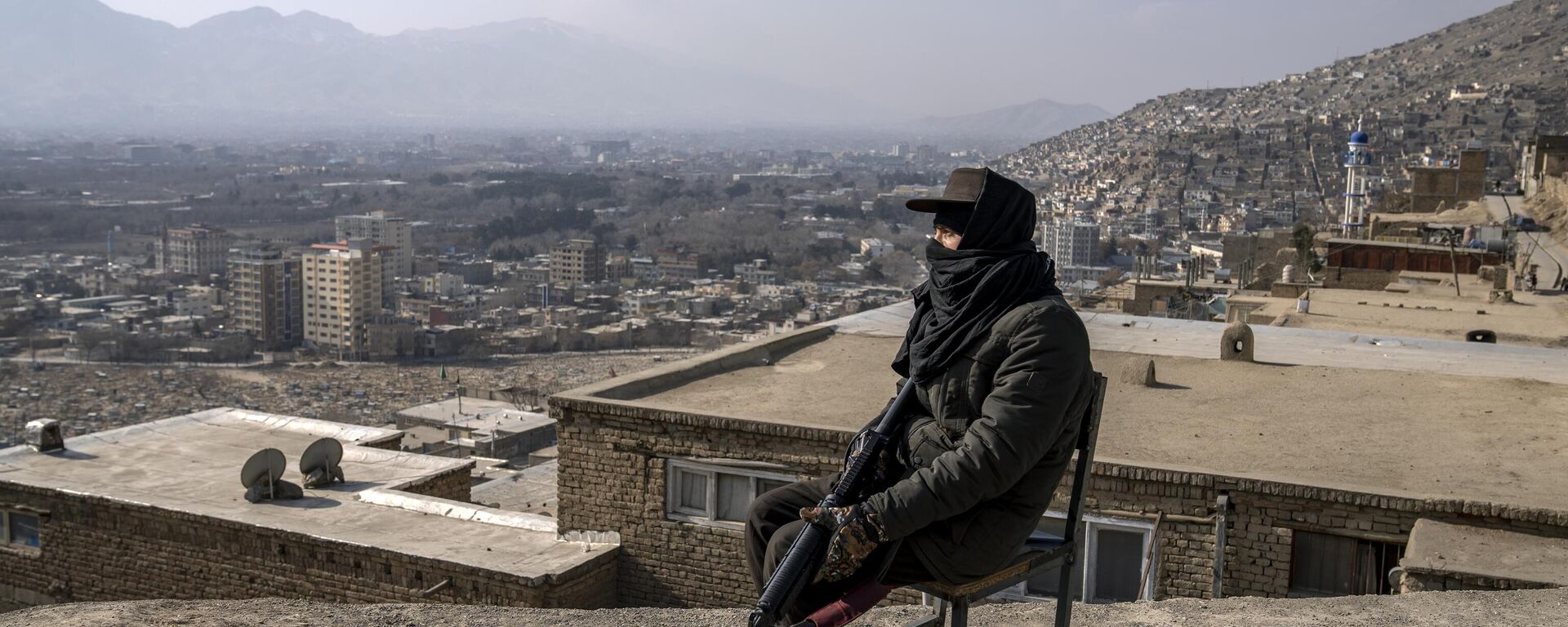https://sputniknews.in/20231205/what-are-us-afghan-diplomats-doing-in-pakistan-5711047.html
What Are US-Afghan Diplomats Doing in Pakistan?
What Are US-Afghan Diplomats Doing in Pakistan?
Sputnik India
US officials are travelling to Pakistan this week to address the pressing issue of Afghan refugees in the country. Sputnik tried to find out more about their agenda in Pakistan.
2023-12-05T14:38+0530
2023-12-05T14:38+0530
2023-12-05T14:50+0530
terrorism
us
pakistan
afghanistan
afghanistan-pakistan border
taliban
refugees
imran khan
nato
us state department
https://cdn1.img.sputniknews.in/img/07e7/0c/05/5710694_0:0:3072:1728_1920x0_80_0_0_a45449152961c89aabf9587dbfa5343f.jpg
Pakistan is set to receive a series of visits by senior US officials starting from tomorrow, as part of an ongoing dialogue between the two nations.The visit of US diplomats comes at a critical time, as Islamabad accuses Afghan authorities of a rise in terrorist attacks and grapples with the controversial ongoing deportation of Afghan refugees from Pakistan. As per the statement by the US State Department, Assistant Secretary of State for the Bureau of Population, Refugees, and Migration, Julieta Valls Noyes, will be visiting Islamabad from December 4 to 7 for a series of meetings. The discussions will focus on key topics: Afghan refugee issues, visa and deportation issues, and the relationship between the Taliban*-led government and Pakistan. Dr Tughral Yamin, researcher at Institute of Policy studies Islamabad, Dean of Centre for International Peace & stability, Ex Brigadier of Pakistan’s Army and Political analyst, told Sputnik, “Assistant Secretary Noyes will most likely buy time for the Afghans whose visas are being processed for resettlement in the US. The Government of Pakistan will most likely ask her to tell her government to give a definite timeline before these Afghans are either deported or asked to leave the country for other destinations. These are not going to be easy negotiations. Depending on how the first round of talks go, more State Department [officials] are likely to visit Pakistan.”US Engagement in Afghanistan: A History of DestabilizationThe US involvement in Afghanistan has had far-reaching consequences, from the Afghan Jihad in the 1980s to the hasty withdrawal of troops in 2021. Pakistan has consistently advocated for a political solution through dialogue, emphasizing the need to avoid prolonged conflict and civilian casualties. However, the US chose a military approach, resulting in protracted conflict and loss of innocent lives. The destabilization caused by US intervention has not only affected Afghanistan but also had repercussions throughout the region especially Pakistan in the form of spreading terrorism.However, the relationship between the United States and Pakistan has long been characterized by a mix of cooperation and tension.Moreover he remarked, “From the very beginning of the US campaign in Afghanistan, Pakistan has been of the view that the Afghan conundrum should be solved politically through dialogue rather than militarily. However, the US chose the latter option which not only resulted in protracted conflict but consumed the lives of millions of innocent civilians.”The Fallout from US Withdrawal: A Looming Humanitarian CrisisAfter two decades of military campaigns, the US and its NATO allies left Afghanistan in ruins.The abrupt withdrawal left behind a fragile security situation, risking a bloody civil war and exacerbating the already dire humanitarian crisis. The burden of dealing with the aftermath fell on neighboring countries like Pakistan, which had been hosting millions of Afghan refugees for years. The US decision to freeze Afghanistan's financial assets and diplomatically isolate the country further worsened the situation, leading to a mass exodus of people into Pakistan.In this context, Khan, shared, “The direct US involvement in Afghanistan not only destabilized the country but also had far-reaching consequences for the entire region. The hasty withdrawal of US and NATO troops after a 20-year military campaign left Afghanistan in ruins, posing significant challenges for neighboring countries like Pakistan. The aftermath included the risk of a humanitarian crisis and the potential for a bloody civil war. However, fortunately, these outcomes were avoided.”Afghan Refugee Dilemma: Balancing Security and HumanityPakistan's decision to deport Afghan citizens without recognized refugee status has sparked controversy. The Pakistani government argues that it cannot bear the burden of a growing population and escalating terrorism. Pakistan’ state claims that Afghan soil is being used to sponsor terrorism and militancy against Pakistan. However, critics argue that the deportation policy overlooks the historical responsibility of the US and its allies in destabilizing Afghanistan, forcing millions of Afghans to live as refugees.Dr Tughral Yamin, Researcher, Strategic and Political analyst, told Sputnik, “After the Taliban had stormed into Kabul on 15 August 2021, thousands of Afghans had fled their country and sought refuge in Pakistan. However, they were promised resettlement in the US but the American government had quite forgotten about these stateless Afghans until the Government of Pakistan threatened to deport them. As collaborators of an occupying force, they fear prosecution in their own country. The Afghans are desperate to leave but they are entirely dependent on the American goodwill and largesse.”Taimur Fahad Khan, nevertheless, told Sputnik, “The renewed US interest in Afghanistan is a cause for concern. Instead of pressuring Pakistan to halt the repatriation of illegal Afghan immigrants, the US and its allies should focus on unfreezing Afghanistan's financial assets and engaging politically with the current government for the benefit of the Afghan people and regional stability. It is essential for the US to genuinely prioritize the upliftment and reconstruction of Afghanistan, which it played a role in destroying, rather than pursuing its own political and strategic interests.”* under UN sanctions for extremism
https://sputniknews.in/20231205/unraveling-the-impact-of-india-pakistan-rivalry-on-afghanistans-future-5705895.html
us
pakistan
afghanistan
afghanistan-pakistan border
peshawar
Sputnik India
feedback.hindi@sputniknews.com
+74956456601
MIA „Rossiya Segodnya“
2023
Muhammad Sharif
https://cdn1.img.sputniknews.in/img/07e7/0b/05/5257054_0:0:443:444_100x100_80_0_0_b8bd2af32be62a6eecdb4a84c7fd978f.jpg
Muhammad Sharif
https://cdn1.img.sputniknews.in/img/07e7/0b/05/5257054_0:0:443:444_100x100_80_0_0_b8bd2af32be62a6eecdb4a84c7fd978f.jpg
News
en_IN
Sputnik India
feedback.hindi@sputniknews.com
+74956456601
MIA „Rossiya Segodnya“
Sputnik India
feedback.hindi@sputniknews.com
+74956456601
MIA „Rossiya Segodnya“
Muhammad Sharif
https://cdn1.img.sputniknews.in/img/07e7/0b/05/5257054_0:0:443:444_100x100_80_0_0_b8bd2af32be62a6eecdb4a84c7fd978f.jpg
us diplomats pakistan, us afghan diplomats, us state department officials in pakistan, us pakistan visit, afghan refugees in pakistan, afghan refugees deportation in pakistan, us policy in afghanistan, us afghan policy, afghan refugees pakistan deportation,
us diplomats pakistan, us afghan diplomats, us state department officials in pakistan, us pakistan visit, afghan refugees in pakistan, afghan refugees deportation in pakistan, us policy in afghanistan, us afghan policy, afghan refugees pakistan deportation,
What Are US-Afghan Diplomats Doing in Pakistan?
14:38 05.12.2023 (Updated: 14:50 05.12.2023) US officials are travelling to Pakistan this week to address the pressing issue of Afghan refugees in the country. Sputnik tried to find out more about their agenda in Pakistan.
Pakistan is set to receive a series of visits by senior US officials starting from tomorrow, as part of an ongoing dialogue between the two nations.
The visit of US diplomats comes at a critical time, as Islamabad accuses Afghan authorities of a rise in terrorist attacks and grapples with the controversial ongoing deportation of Afghan refugees from Pakistan.
According the Pakistani Foreign Ministry Spokesperson Mumtaz Zahra Baloch who said to Pakistani media on Monday that the talks aim to find solutions and strengthen cooperation between the two nations amidst these challenges.
As per the statement by the US State Department, Assistant Secretary of State for the Bureau of Population, Refugees, and Migration, Julieta Valls Noyes, will be visiting Islamabad from December 4 to 7 for a series of meetings. The discussions will focus on key topics: Afghan refugee issues, visa and deportation issues, and the relationship between the Taliban*-led government and Pakistan.
Dr Tughral Yamin, researcher at Institute of Policy studies Islamabad, Dean of Centre for International Peace & stability, Ex Brigadier of Pakistan’s Army and Political analyst, told Sputnik, “Assistant Secretary Noyes will most likely buy time for the Afghans whose visas are being processed for resettlement in the US. The Government of Pakistan will most likely ask her to tell her government to give a definite timeline before these Afghans are either deported or asked to leave the country for other destinations. These are not going to be easy negotiations. Depending on how the first round of talks go, more State Department [officials] are likely to visit Pakistan.”
However, Taimur Fahad Khan, a foreign policy and political analyst and researcher associated with the Institute of Strategic Studies in Islamabad, told Sputnik, “After two years since the withdrawal of US troops, there is a growing interest from the US in Afghanistan once again. The power vacuum left by the US withdrawal has been filled by other actors, particularly regional countries, in a relatively stable manner.”
US Engagement in Afghanistan: A History of Destabilization
The US involvement in Afghanistan has had far-reaching consequences, from the Afghan Jihad in the 1980s to the hasty withdrawal of troops in 2021.
Pakistan has consistently advocated for a political solution through dialogue, emphasizing the need to avoid prolonged conflict and civilian casualties. However, the US chose a military approach, resulting in protracted conflict and loss of innocent lives. The destabilization caused by US intervention has not only affected Afghanistan but also had repercussions throughout the region especially Pakistan in the form of spreading terrorism.
However, the relationship between the United States and Pakistan has long been characterized by a mix of cooperation and tension.
In this regard, Taimur Fahad Khan, a foreign policy and political analyst said, “US involvement in Afghanistan has consistently had destabilizing effects, from the Afghan Jihad in the 1980s to the hasty withdrawal of foreign troops in 2021. The current troubling situation in Afghanistan can be attributed to the abrupt departure of US and foreign forces on August 15, 2021.
Moreover he remarked, “From the very beginning of the US campaign in Afghanistan, Pakistan has been of the view that the Afghan conundrum should be solved politically through dialogue rather than militarily. However, the US chose the latter option which not only resulted in protracted conflict but consumed the lives of millions of innocent civilians.”
The Fallout from US Withdrawal: A Looming Humanitarian Crisis
After two decades of military campaigns, the US and its NATO allies left Afghanistan in ruins.
The abrupt withdrawal left behind a fragile security situation, risking a bloody civil war and exacerbating the already dire humanitarian crisis. The burden of dealing with the aftermath fell on neighboring countries like Pakistan, which had been hosting millions of Afghan refugees for years. The US decision to freeze Afghanistan's financial assets and diplomatically isolate the country further worsened the situation, leading to a mass exodus of people into Pakistan.
Fahad Khan, a foreign policy and political analyst, told Sputnik, “Since the Taliban's rise to power in Afghanistan and the influx of Afghan refugees into Pakistan, cross-border terrorist attacks in Pakistan have increased. To safeguard its national interests and counter these threats, the Government of Pakistan has implemented a strategy to repatriate all illegal Afghan refugees back to Afghanistan.”
In this context, Khan, shared, “The direct US involvement in Afghanistan not only destabilized the country but also had far-reaching consequences for the entire region. The hasty withdrawal of US and NATO troops after a 20-year military campaign left Afghanistan in ruins, posing significant challenges for neighboring countries like Pakistan. The aftermath included the risk of a humanitarian crisis and the potential for a bloody civil war. However, fortunately, these outcomes were avoided.”
Afghan Refugee Dilemma: Balancing Security and Humanity
Pakistan's decision to deport Afghan citizens without recognized refugee status has sparked controversy.
The Pakistani government argues that it cannot bear the burden of a growing population and escalating terrorism. Pakistan’ state claims that Afghan soil is being used to sponsor terrorism and militancy against Pakistan. However, critics argue that the deportation policy overlooks the historical responsibility of the US and its allies in destabilizing Afghanistan, forcing millions of Afghans to live as refugees.
Dr Tughral Yamin, Researcher, Strategic and Political analyst, told Sputnik, “After the Taliban had stormed into Kabul on 15 August 2021, thousands of Afghans had fled their country and sought refuge in Pakistan. However, they were promised resettlement in the US but the American government had quite forgotten about these stateless Afghans until the Government of Pakistan threatened to deport them. As collaborators of an occupying force, they fear prosecution in their own country. The Afghans are desperate to leave but they are entirely dependent on the American goodwill and largesse.”
Moreover, he adds, “Government of Pakistan despite its economic constraints has done its best in accommodating Afghan refugees for nearly four decades. There is a strong sense now that the Afghans have overstayed their welcome. Pakistan also legitimately feels that the current Afghan Government has failed to live up to its promise to not allow terrorists to use their territory as launching pads for their maleficent operations inside Pakistan. For the Afghans trapped in Pakistan, this is unfortunately a no-win situation.”
Taimur Fahad Khan, nevertheless, told Sputnik, “The renewed US interest in Afghanistan is
a cause for concern. Instead of pressuring Pakistan to halt the repatriation of illegal Afghan immigrants, the US and its allies should focus on unfreezing Afghanistan's financial assets and engaging politically with the current government for the benefit of the Afghan people and regional stability. It is essential for the US to genuinely prioritize the upliftment and reconstruction of Afghanistan, which it played a role in destroying, rather than
pursuing its own political and strategic interests.”
Moreover, Khan said,” The US is currently pressuring Pakistan to halt the repatriation of illegal immigrants from Afghanistan, instead of focusing on assisting Pakistan in addressing cross-border terrorism as agreed upon in the Doha Accord. However, Pakistan has the right, according to international law, to carry out such repatriations.”
* under UN sanctions for extremism



